Henslin James M. Sociology: A Down to Earth Approach
Подождите немного. Документ загружается.


Barter Coins Deposit Receipts Fiat Currency
Debit Cards E-Cash
Currency
The Transformation of the Medium of Exchange
As each type of economy evolved, so, too, did the medium of exchange, the means by
which people value and exchange goods and services. As we review the changes summa-
rized in the time-event line at the bottom of this page, you’ll see how the medium of ex-
change reflects a country’s economy.
Earliest Mediums of Exchange
Hunting and gathering and pastoral and horticultural societies produced little surplus, and
people bartered, directly exchanging one item for another. In later societies, surpluses
grew and trade expanded, making barter too cumbersome. People then developed new
ways of placing values on goods and services so they could trade them. Let’s look at how
the medium of exchange was transformed.
Medium of Exchange in Agricultural Societies
Although bartering continued in agricultural societies, people increasingly came to use money,
a medium of exchange that places a value on items. In most places, money consisted of gold
and silver coins. A coin’s weight and purity determined the amount of goods or services it
could purchase. In some places, people made purchases with deposit receipts. These receipts
transferred ownership to a specified number of ounces of gold or silver, or bushels of grain,
or to a specified amount of other goods that were on deposit in a warehouse or bank. Toward
the end of the agricultural period, deposit receipts became formalized into currency (paper
money). Each piece of paper represented a specific amount of gold or silver stored in a ware-
house. Currency and deposit receipts represented stored value. No more currency or deposit
receipts could be issued than the total amount of gold or silver in the warehouse. Gold and
silver coins continued to circulate alongside the deposit receipts and currency.
Medium of Exchange in Industrial Societies
With few exceptions, bartering became a thing of the past in industrial societies. Gold was
replaced by paper currency, which, in the United States, could be exchanged for gold stored
at Fort Knox. This policy was called the gold standard. As long as each dollar represented a
specified amount of gold, the number of dollars that could be issued was limited. Toward the
end of this period, U.S. paper money could no longer be exchanged for gold or silver. Instead,
there was fiat money, currency issued by a government that is not backed by stored value.
When fiat money replaced stored value, coins made of precious metals disappeared from
circulation. People considered these coins more valuable, and they were unwilling to part
with them. In the United States, gold coins disappeared first, followed by the largest silver
coin, the dollar. Then, as inferior metals (copper, zinc, and nickel) replaced the smaller silver
coins, people began to hoard these silver coins, and they, too, disappeared from circulation.
Even without a gold standard that restricts the amount of currency issued to the
amount of stored value, governments have a practical limit on the amount of paper money
they can distribute. In general, prices increase if a government issues currency at a rate
higher than the growth of its gross domestic product (GDP), the total goods and serv-
ices that a country produces. This condition, inflation, means that each unit of currency
will purchase fewer goods and services. Governments try to control inflation, for high in-
flation is a destabilizing influence.
The Transformation of the Medium of Exchange 401
FIGURE 14.1 Changes in the Medium of Exchange
Note: This figure depicts a general course of development, not a hard sequence of events. Credit cards are not shown, as they are not a
medium of exchange but an IOU, a version of merchants’ charge accounts.
Source: By the author.
medium of exchange the
means by which people place a
value on goods and services in
order to make an exchange—
for example, currency, gold, and
silver
barter the direct exchange of
one item for another
money any item (from sea
shells to gold) that serves as a
medium of exchange; today,
currency is the most common
form
deposit receipt a receipt
stating that a certain amount
of goods is on deposit in a
warehouse or bank; the receipt
is used as a form of money
currency paper money
stored value the goods that
are stored and held in reserve
that back up (or provide the
value for) a currency
gold standard paper money
backed by gold
fiat money currency issued
by a government that is not
backed by stored value
gross domestic product
(GDP)
the amount of goods
and services produced by a
nation
inflation an increase in prices
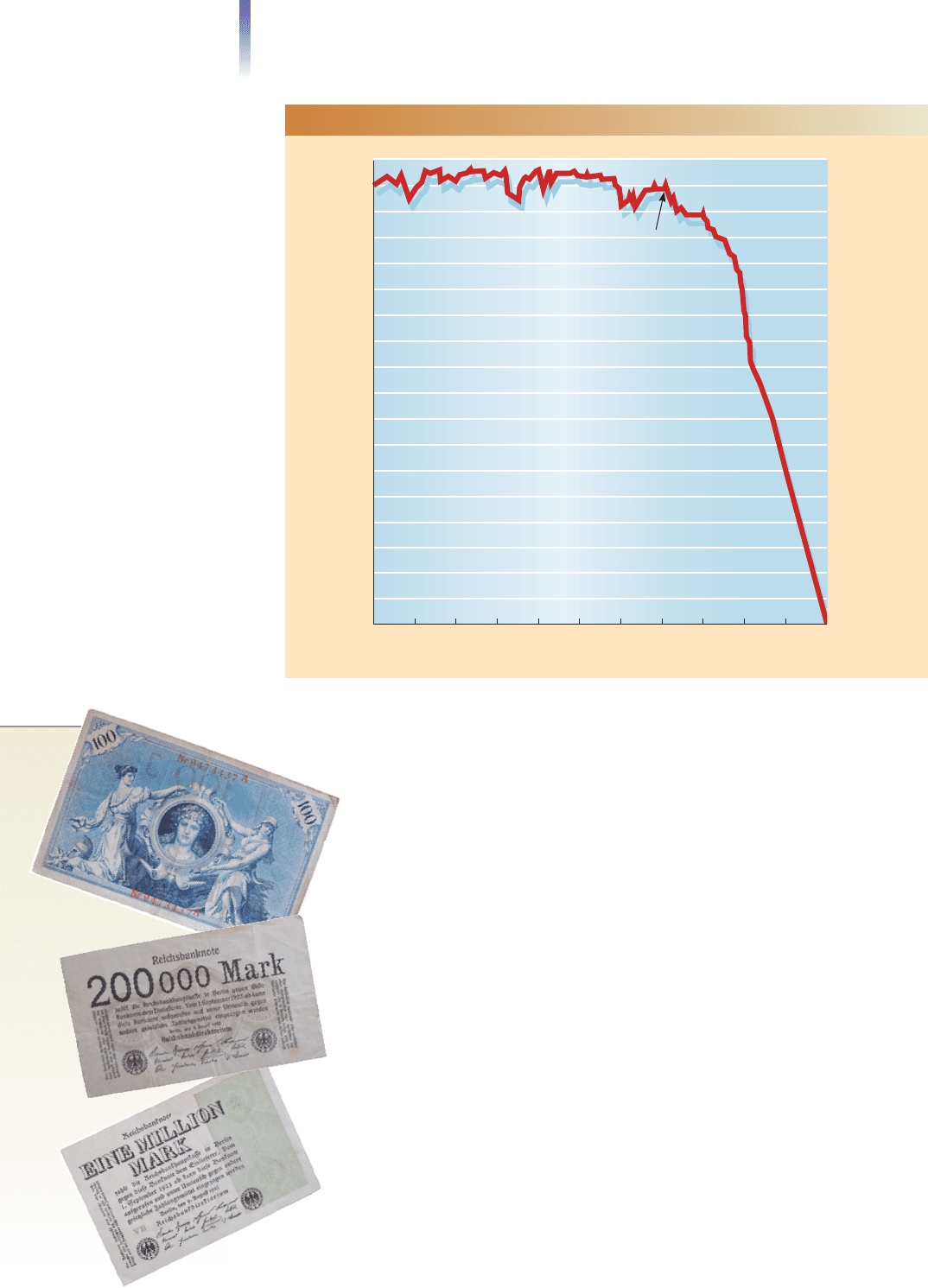
Amount Needed to Purchase
the Same Basket of Goods
$1
$2
$3
$4
$5
$6
$7
$8
$9
$1.00
.50
.35
.25
.20
.17
.14
.13
.11
Purchasing Power of the Current
Dollar in Terms of the 1941 Dollar
1800
Year
1820
1840
1860
1
880
1900
1920
1940
1960
1980
$12
$13
$14
$18
.10$10
.08
.07
.06
$15 .05
$16 .04
$17 .03
2000
When the U.S. went
off the gold standard
.09$11
2020
.02
As you can see from Figure 14.2 as long as the gold standard limited the amount of cur-
rency, the purchasing power of the dollar remained relatively stable. When the United
States left the gold standard in 1937, the dollar no longer represented stored value,
and it plunged in value. Today, the dollar is but a skinny shadow of its former self,
retaining only about 5 percent of its earlier purchasing power—and shrinking rapidly.
Inflation in the United States is usually mild, less than 5 percent a year. People
get used to gradual increases in prices. High inflation, in contrast, makes life diffi-
cult, and when inflation goes wild, it upsets everything. How would you like to pay
$800,000 for a little bread roll? Or $1,000,000 for a chicken? How about $417 for a
single piece of scratchy toilet paper? These are actual prices in Zimbabwe, where in-
flation has run wild (Wines 2006b; Bearak 2008). A Coke was really high,
$15,000,000,000 (Walker and Higgins 2008). That was at noon. By dinner, of
course, it cost a few million more (all prices in Zimbabwean money, not U.S. dollars).
After World War I, Germany was ravaged by high inflation, which helped to usher
Hitler into power. Look at the photos to the left. The large, beautiful bill—which I
bought in an antique shop—looks and feels as though it had been engraved. Al-
though it is only 100 marks, with this 1908 bill you could buy a car. The smaller
bills of 200,000 and 1 million marks, churned out by the German mint in 1923 at the
height of inflation after World War I, look and feel like Monopoly money. With them,
you could buy a loaf of bread—if you rushed to the store before the price rose.
In industrialized societies, checking accounts became common. A check is a type
of deposit receipt, for it is a promise that the check’s writer has deposited enough
currency in the warehouse (the bank or credit union) to cover the check. The lat-
ter part of the industrial period saw the invention of the credit card. This device
allows someone who has been approved for a specified amount of credit to purchase
goods without an immediate exchange of money—either metal, currency, or check. The
owner of the credit card is then billed for the purchase.
402 Chapter 14 THE ECONOMY
FIGURE 14.2 Declining Value of the U.S. Dollar
Source: Modified from “Alternative Investment Market Letter,” November 1991.

Medium of Exchange in Postindustrial Societies
During the first part of the postindustrial (or information) society, paper money cir-
culated freely. Paper money then became less common, gradually being replaced by
checks and credit cards. The next development was the debit card, a device that elec-
tronically withdraws the cost of an item from the cardholder’s bank account. Like the
check, the debit card is a type of deposit receipt, for it transfers ownership of currency
on deposit.
The latest evolution of money is e-cash, money stored on a company’s computer that
can be transferred over the Internet to anyone who has an account with that company.
E-cash can be used for making purchases and for paying bills. We can use the term
e-currency to refer to the most common form of e-cash. E-currency represents an amount
recorded in a government’s paper money, such as so many dollars or euros.
The second form of e-cash is electronic gold, which represents a balance in units of
gold. A transaction in e-gold is actually the transfer of ownership to a specified amount
of gold, which the owner has stored in a bank’s vault. E-gold takes us back to the time
when people made transactions in gold and silver—this time, in contrast, using an elec-
tronic form for the exchange. The value of an electronic gold account goes up or down
depending on the price of gold. Because electronic gold is not issued by any national gov-
ernment, it does not represent the transfer of euros or dollars or any other currency. This
makes electronic gold a non-national money that can be used by citizens of any govern-
ment. Governments dislike the development of e-cash, in general, as the transactions
bypass banks, making it difficult for governments to monitor the financial activities of
their citizens. E-gold poses a special threat, for it even bypasses government-issued cur-
rencies. Consequently, we can expect extensive legislation to help governments regain
control over money.
World Economic Systems
Now that we have sketched the main historical changes in the means of exchange, let’s
compare capitalism and socialism, the two main economic systems in force today. This will
help us to understand where the United States stands in the world economic order.
Capitalism
People who live in a capitalist society may not understand its basic tenets, even though they
see them reflected in their local shopping malls and fast-food chains. Table 14.1 distills the
many businesses of the United States down to their basic components. As you can see,
capitalism has three essential features: (1) private ownership of the means of production (indi-
viduals own the land, machines, and factories); (2) market competition (competing with one
another, the owners decide what to produce and set the prices for their products); and (3) the
pursuit of profit (the owners try to sell their products for more than what they cost).
No country has pure capitalism. Pure capitalism, known as laissez-faire capitalism
(literally “hands off” capitalism), means that the government doesn’t interfere in the market.
World Economic Systems 403
credit card a device that al-
lows its owner to purchase
goods and to be billed later
debit card a device that
allows its owner to charge pur-
chases against his or her bank
account
e– cash digital money that is
stored on computers; it is of
two types, e-currency and
e-gold
capitalism an economic sys-
tem characterized by the pri-
vate ownership of the means
of production, the pursuit of
profit, and market competition
laissez-faire capitalism
unrestrained manufacture and
trade (literally “hands off ”
capitalism)
TABLE 14.1 Comparing Capitalism and Socialism
Capitalism Socialism
1. Individuals own the means of
production.
2. Based on competition, the owners
determine production and set prices.
3. The pursuit of profit is the reason for
distributing goods and services.
1. The public owns the means of production.
2. Central committees plan production and set
prices; no competition.
3. No profit motive in the distribution of goods
and services.
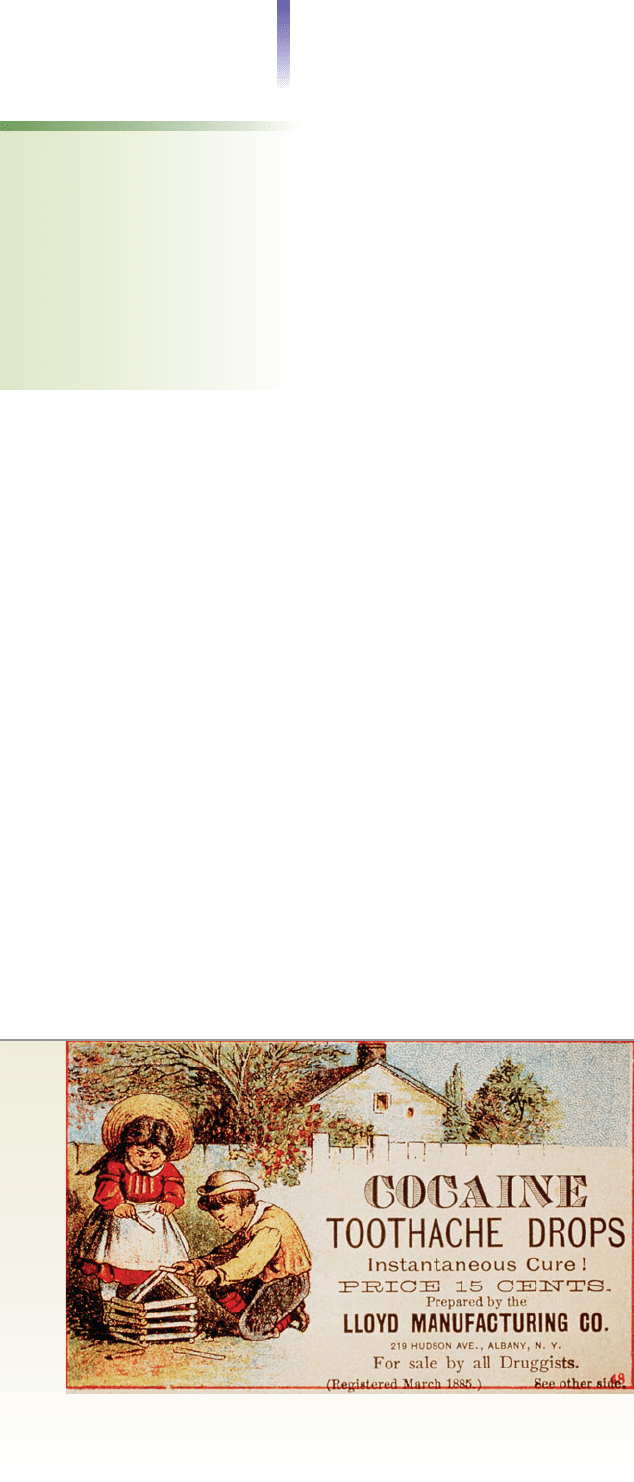
welfare (or state) capital-
ism
an economic system in
which individuals own the
means of production but the
state regulates many economic
activities for the welfare of the
population
monopoly the control of an
entire industry by a single
company
The current form of U.S. capitalism is welfare or state capitalism. Private citizens own
the means of production and pursue profits, but they do so within a vast system of laws
designed to protect the welfare of the population.
Consider this example:
Suppose that you discover what you think is a miracle tonic: It will grow hair, erase wrinkles,
and dissolve excess fat. If your product works, you will become an overnight sensation—
not only a multimillionaire, but also the toast of television talk shows and the darling of
Hollywood.
But don’t count on your money or fame yet. You still have to reckon with market re-
straints, the laws and regulations of welfare capitalism that limit your capacity to pro-
duce and sell. First, you must comply with local and state laws. You must obtain a business
license and a state tax number that allows you to buy your ingredients without paying sales
taxes. Then come the federal regulations. You cannot simply take your product to local
stores and ask them to sell it; you first must seek approval from federal agencies that mon-
itor compliance with the Pure Food and Drug Act. This means that you must prove that
your product will not cause harm to the public. Your manufacturing process is also sub-
ject to federal, state, and local laws concerning fraud, hygiene, and the disposal of haz-
ardous wastes.
Suppose that you overcome these obstacles, and your business prospers. Other federal
agencies will monitor your compliance with laws concerning racial, sexual, and disability
discrimination; minimum wages; and Social Security taxes. State agencies will examine your
records to see whether you have paid unemployment taxes and sales taxes. Finally, as your
shadowy business partner, the Internal Revenue Service will look over your shoulder and de-
mand about 35 percent of your profits.
To see how welfare or state capitalism developed in the United States, let’s go back to
an earlier era. Back in the 1800s, when capitalism was in its infancy, you could have made
your “magic” potion at home and sold it at any store willing to handle it. You could have
advertised that it cured baldness, erased wrinkles, and dissolved fat, for no agency existed
to monitor your product or your claims. As you can see from the 1885 poster below, this
is precisely what thousands of individuals did at that time. They made “elixirs” in their
basements and gave them whimsical names such as “Granny’s Miracle Medicine” and
“Elixir of Health and Happiness.” They might claim that their product could restore sex-
ual potency, purge the intestines, and make people more intelligent. These tonics often
made people feel better, for many elixirs were braced with alcohol—and even cocaine
(Ashley 1975). (The Coca in Coca-Cola refers to cocaine, which this “pick-me-up” drink
contained until 1903.) To protect the public’s
health, in 1906 the federal government passed the
Pure Food and Drug Act and began to regulate
products.
John D. Rockefeller’s remarkable success in un-
regulated markets helps to explain why the gov-
ernment began to regulate capitalism. After a
ruthless drive to eliminate competition, Rocke-
feller managed to corner the U.S. oil and gasoline
market (Chernow 1998). He slashed prices and
then doubled them after driving out the competi-
tion. He even sabotaged competitors’ pipelines
and refineries (Josephson 1949). With his com-
petitors crippled or eliminated, his company, Stan-
dard Oil, was able to dictate prices to the entire
nation. Rockefeller had achieved the capitalist’s
dream, a monopoly, the control of an entire in-
dustry by a single company.
Rockefeller had played the capitalist game too
well, however, for he had wiped out one of its
404 Chapter 14 THE ECONOMY
This advertisement from 1885 represents an early stage of capitalism when
individuals were free to manufacture and market products with little or no
interference from the government. Today, the production and marketing of
goods take place under detailed, complicated government laws and regulations.
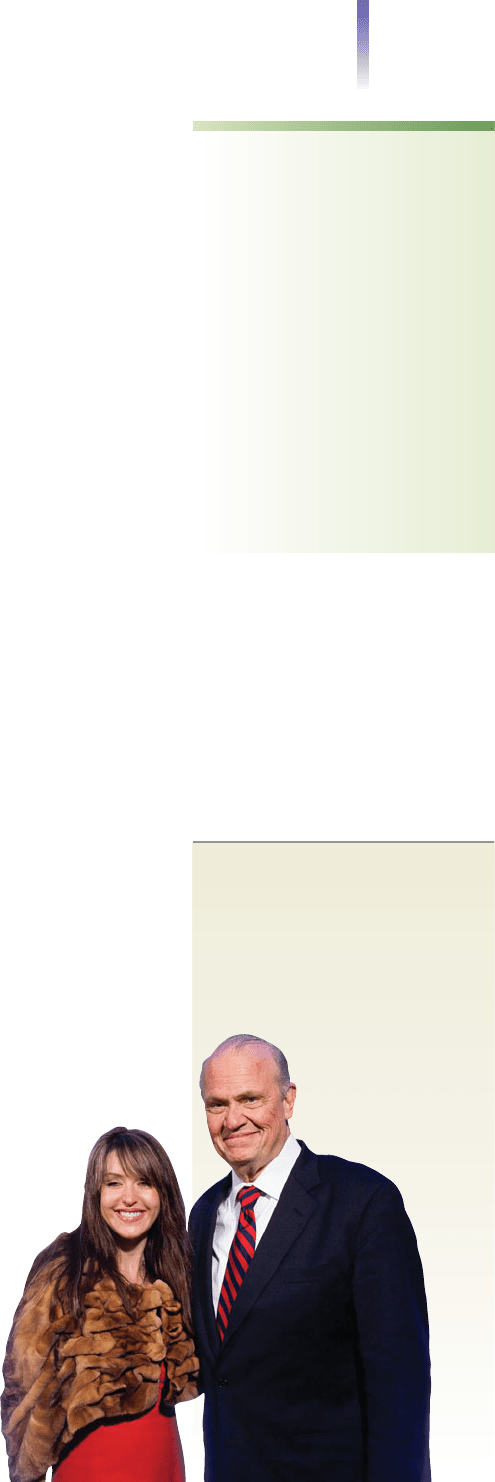
essential components: competition. Consequently, to protect this cornerstone of capitalism,
the federal government passed antimonopoly legislation and broke up Standard Oil.
Today, the top firms in each industry—such as General Electric in household appliances—
must obtain federal approval before acquiring another company in the same industry. If
the government determines that one firm dominates a market, it can force that company
to divest (sell off ) some of the businesses it owns.
Another characteristic of welfare capitalism is that although the government encour-
ages competition, it establishes its own monopoly over what it calls “common good” items.
These are items and services presumed essential for the common good of the citizens,
such as armed forces, highways, and sewers.
Socialism
As shown in Table 14.1 on page 403, socialism also has three essential components: (1)
public ownership of the means of production, (2) central planning, and (3) the distribu-
tion of goods without a profit motive.
In socialist economies, the government owns the means of production—not only the
factories but also the land, railroads, oil wells, and gold mines. Unlike capitalism, in which
market forces—supply and demand—determine both what will be produced and the
prices that will be charged, a central committee decides that the country needs X num-
ber of toothbrushes, Y toilets, and Z shoes. The committee decides how many of each will
be produced, which factories will produce them, what price will be charged for the items,
and where they will be distributed.
Socialism is designed to eliminate competition, for goods are sold at predetermined
prices regardless of the demand for an item or the cost of producing it. The goal is not to
make a profit, nor is it to encourage the consumption of goods that are in low demand
(by lowering the price) or to limit the consumption of hard-to-get goods (by raising the
price). Rather, the goal is to produce goods for the general welfare and to distribute them
according to people’s needs, not their ability to pay.
In a socialist economy everyone in the economic chain works for the government. The
members of the central committee who set production goals are government employees,
as are the supervisors who implement their plans, the factory workers who produce the
merchandise, the truck drivers who move it, and the clerks who sell it. Those who buy the
items may work at different jobs—in offices, on farms, or in day care centers—but they,
too, are government employees.
Just as capitalism does not exist in a pure form, neither does socialism. Although the
ideology of socialism calls for resources to be distributed according to need and not the
ability to pay, socialist countries found it necessary to pay higher salaries for some jobs in
order to entice people to take on greater responsibilities. Factory managers, for example,
always earned more than factory workers. These differences in pay follow the functional-
ist argument of social stratification presented in Chapter 9 (pages 239–240). By nar-
rowing the huge pay gaps that characterize capitalist nations, however, socialist
nations established considerably greater equality of income.
Dissatisfied with the greed and exploitation of capitalism and the lack of
freedom and individuality of socialism, Sweden and Denmark developed
democratic socialism (also called welfare socialism). In this form of social-
ism, both the state and individuals produce and distribute goods and
services. The government owns and runs the steel, mining, forestry, and
energy concerns, as well as the country’s telephones, television stations,
and airlines. Remaining in private hands are the retail stores, farms,
factories, and most service industries.
Ideologies of Capitalism and Socialism
Not only do capitalism and socialism have different approaches to
producing and distributing goods but they also represent opposing
belief systems. Capitalists believe that market forces should determine
World Economic Systems 405
socialism an economic sys-
tem characterized by the pub-
lic ownership of the means of
production, central planning,
and the distribution of goods
without a profit motive
market forces the law of
supply and demand
democratic socialism a hy-
brid economic system in which
the individual ownership of
businesses is mixed with the
state ownership of industries
thought essential to the public
welfare, such as the postal
service and the delivery of
medicine and utilities
Successful capitalists can buy most
things in life, including trophy wives.
Some trade their entrepreneurial
success (money, property,
sometimes fame) for younger,
beautiful women. Fred Thompson,
age 66, a successful, wealthy actor
and trial lawyer who also
served as U.S. Senator
from Tennessee, is
married to Jeri
Kehn, age 42.
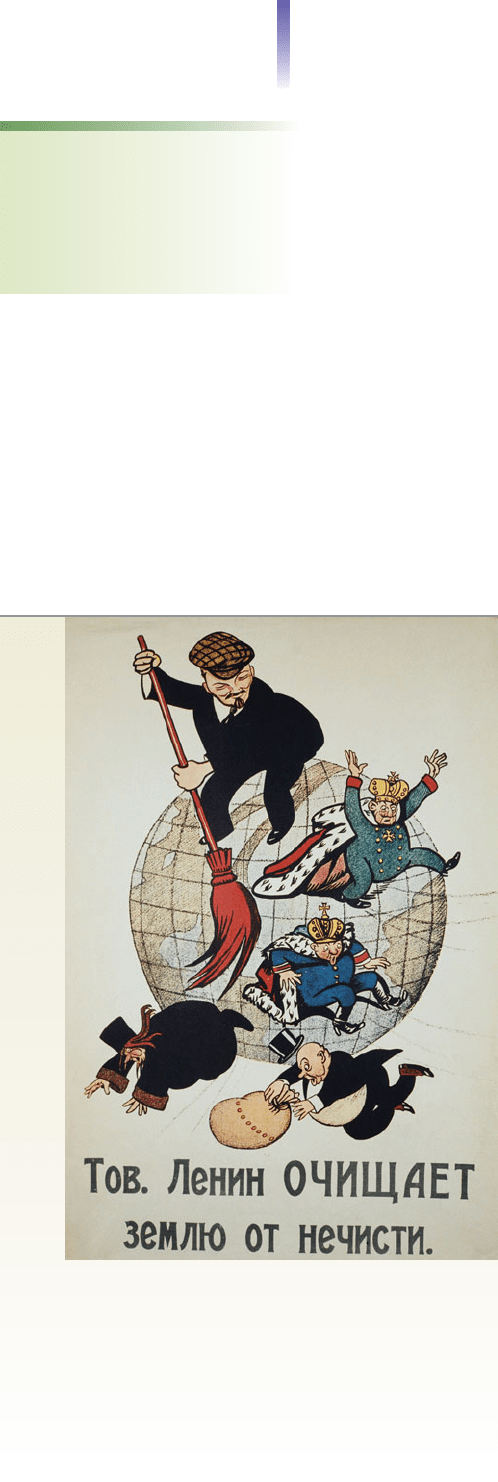
both products and prices. They also believe that profits are good for humanity. The poten-
tial to make money stimulates people to produce and distribute goods, as well as to develop
new products. Society benefits, as the result is a more abundant supply of goods at cheaper
prices.
Socialists take an opposite view of profits. They consider them to be immoral. An item’s
value is based on the work that goes into it, said Karl Marx. The only way there can be
profit, he stressed, is by paying workers less than the value of their labor. Profit, then, is
an excess value that has been withheld from workers. Socialists believe that the govern-
ment should protect workers from this exploitation. To do so, the government should
own the means of production, using them not to generate profit but to produce items that
match people’s needs, not their ability to pay.
Capitalists and socialists paint each other in such stark colors that each perceives the
other system as one of exploitation. Capitalists believe that socialists violate people’s basic
right to make their own decisions and to pursue opportunity. Socialists believe that
capitalists violate people’s basic right to be free from poverty. With each side claiming
moral superiority while viewing the other as a threat to its very existence, the last cen-
tury witnessed the world split into two main blocs. In what was known as the Cold
War, the West armed itself to defend and promote capitalism, the East to defend and
promote socialism.
Criticisms of Capitalism and Socialism
The primary criticism leveled against capitalism is that it leads to
social inequality. Capitalism, say its critics, produces a tiny top
layer of wealthy people who exploit an immense bottom layer of
poorly paid workers. Another criticism is that the tiny top layer
wields vast political power. Those few who own the means of pro-
duction reap huge profits, accrue power, and get legislation passed
that goes against the public good.
The primary criticism leveled against socialism is that it does not
respect individual rights. Others (in the form of some government
body) control people’s lives. They decide where people will live,
work, and go to school. In China, they even decide how many chil-
dren women may bear (Mosher 1983, 2006). Critics also argue that
central planning is grossly inefficient and that socialism is not capa-
ble of producing much wealth. They say that its greater equality re-
ally amounts to giving almost everyone an equal chance to be poor.
The Convergence of Capitalism
and Socialism
Regardless of the validity of these mutual criticisms, as nations in-
dustrialize they come to resemble one another. They urbanize, en-
courage higher education, and produce similar divisions of labor
(such as professionals and skilled technicians; factory workers and
factory managers). Similar values also emerge (Kerr 1983). By it-
self, this tendency would make capitalist and socialist nations grow
more alike, but another factor also brings them closer to one an-
other (Form 1979): Despite their incompatible ideologies, both
capitalist and socialist systems have adopted features from the
other.
That capitalism and socialism are growing similar is known as
convergence theory. Fundamental changes in socialist countries
give evidence for this coming hybrid, or mixed, economy. Rus-
sians suffered from the production of shoddy goods, they were
plagued by shortages, and their standard of living lagged severely
behind that of the West. To try to catch up, in the 1980s and
406 Chapter 14 THE ECONOMY
convergence theory the
view that as capitalist and so-
cialist economic systems each
adopt features of the other, a
hybrid (or mixed) economic
system will emerge
Throughout most of the twentieth century, capitalism and
communism were pitted against one another in a deadly
struggle. Each thought of itself as the correct economic
form, and each viewed the other as an evil to be
eradicated. In support of this view of essential goodness
and evil, proponents of each system launched global
propaganda campaigns.This poster from about 1920 says:
“Comrade Lenin cleanses the filth from the earth.” Those
being swept away are rich royalty at the top, the clergy
(lower left), and capitalists (lower right).
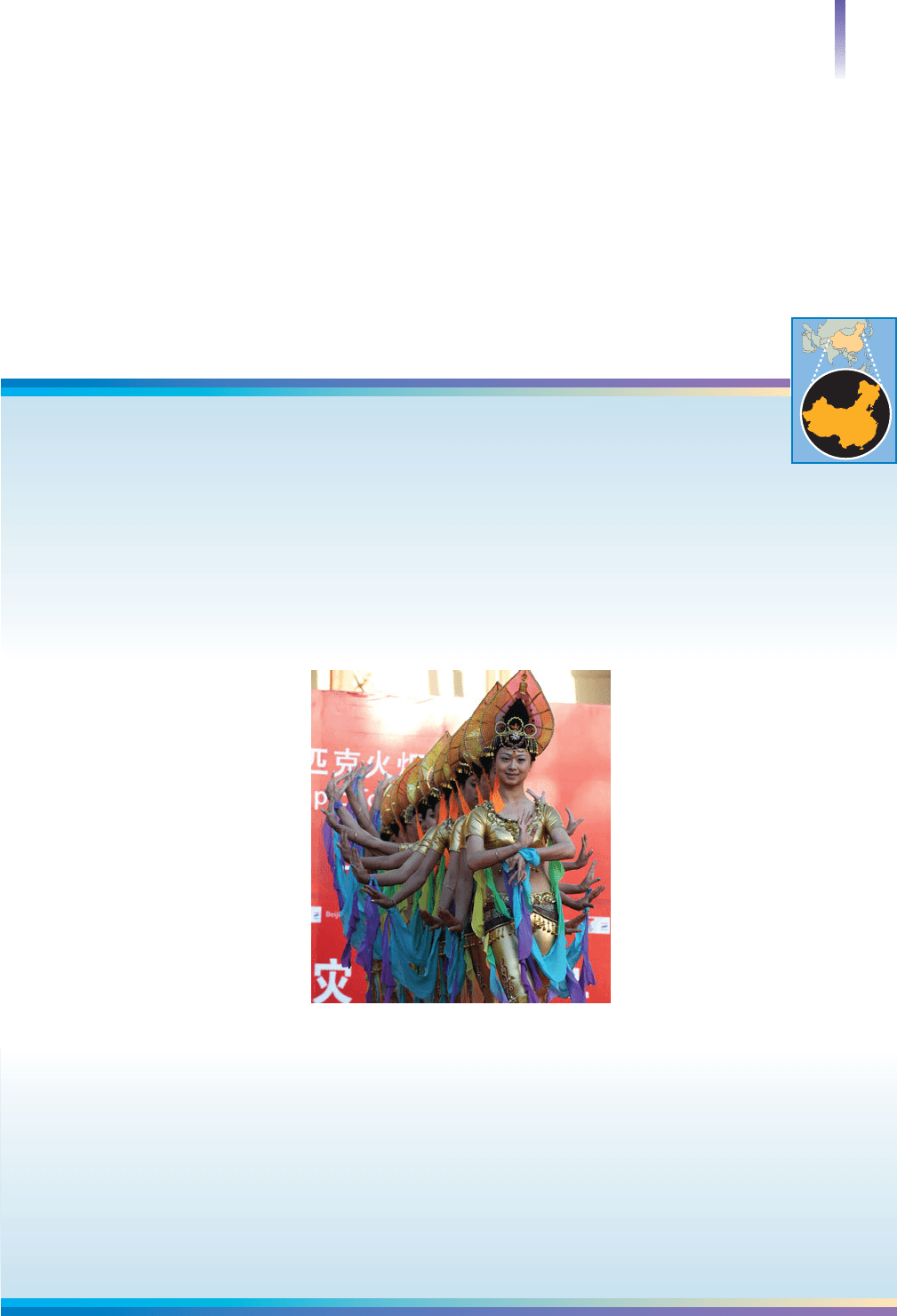
1990s the rulers of Russia made the private ownership of property legal and aban-
doned communism. Making a profit—which had been a crime—was encouraged.
China joined the change, but kept a communist government. In its converged form of
“capunism,” capitalists joined the Communist party. The convergence is so great that
when the Western governments began stimulus plans to counter the economic crisis,
China joined in with a huge stimulus plan of its own (Batson 2009). Even Western
banks have been welcomed in China, so they can provide specialized services to China’s
300,000 new millionaires (Reuters 2008). Perhaps the point that best summarizes this
remarkable change is this: Some textbooks in China now give more space to Bill Gates
than to Mao (Guthrie 2008). The Cultural Diversity box below provides a glimpse of
the new capitalism in China.
World Economic Systems 407
Cultural Diversity around the World
The New Capitalism in China
S
ocialism has the virtue of making people more
equal. Socialism’s equality, however, translates into
distributing poverty throughout a society. Under
socialism, almost everyone becomes equally poor.
Capitalism, in contrast, has the virtue of producing
wealth. A lot of people remain poor, however, leaving a
sharp contrast in wealth and poverty,
one that produces envy and some-
times creates social unrest.
Chinese leaders realized the
wealth-producing capacity of capital-
ism and wanted that for their people.
In the Chinese version they pro-
duced—capitalism directed by com-
munists—wealth is being produced. In
all the world’s history, this new capital-
ism has lifted the largest number of
people out of poverty in the shortest
time. The poor who are left behind,
however, aren’t happy when their land
is taken from them to help make oth-
ers wealthy. The anger and resentment
have kept the Party busy, for its army
has had to squelch a lot of riots.
In Beijing, the capital of China, stands
a mansion built by Zhang Yuchen. This is
no ordinary mansion, like those built by
China’s other newly rich.This imposing
building is a twin of the Chateau de Maisons-Laffitte, an ar-
chitectural landmark on the Seine River outside Paris. At
a cost of $50 million, the Beijing replica matches the origi-
nal edifice detail for detail. The architects even used the
original blueprints of the French chateau, and the building
features the same Chantilly stone (Kahn 2004, 2007b).
The cost of this Chinese version of the chateau was
actually greater than $50 million. The acreage set aside
for the mansion and a housing development of luxury
homes made eight hundred farmers landless.
But not to worry. The spiked fence, the moat, and
the armed guards—looking sharp in their French-style
uniforms complete with capes and kepis—keep the
peasants out of the chateau.
In most places, you need connections to become
wealthy. In China, this means connections with the Com-
munist Party, for this group still
holds the power. Yuchen has those
connections. As a member of the
Party, it was his job to direct Bei-
jing’s construction projects. With
his deep connections,Yuchen was
able to get the wheat fields farmed
by the peasants rezoned from farm-
land to a “conservation area.” He
was even able to divert a river so
he could build the moat around the
chateau, one of the finishing touches
on his architectural wonder.
It isn’t as though the peasants
have been left with nothing. As
part of Yuchen’s deal to get the
land, he gives $45 a month to each
of the elderly. And the younger
peasants can work in the vineyards
that Yuchen is planting. French wine
will top off the project.
For Your Consideration
When China has completed its transition to capitalism,
what do you think the final version will look like (that
is, what characteristics do you think it will have)? Where
will the top Party leaders fit in the class system that is
emerging? Why? (To answer this, consider the connec-
tions and resources of the elite.)
Like a debutante being introduced to society, the
Chinese comcapitalists presented themselves on the
world stage at the Beijing Olympics. This photo is
from the games’ closing ceremonies.
China
China

Changes in capitalism also support this theory. The United States has adopted many
socialist practices. One of the most obvious is the government taking money from some
individuals to pay for the benefits it gives to others. Examples include unemployment
compensation (taxes paid by workers are distributed to those who no longer produce a
profit); subsidized housing (shelter, paid for by the many, is given to the poor and eld-
erly, with no motive of profit); welfare (taxes from the many are distributed to the needy);
a minimum wage (the government, not the employer, determines the minimum that
workers receive); and Social Security (the retired do not receive what they paid into the
system, but, rather, money that the government collects from current workers). Finally,
in 2008 when Wall Street and auto firms started to buckle, the government stepped in
to shore up these businesses, even buying ownership in some of these firms, firing CEOs,
and setting salary limits. Such an embrace of socialist principles indicates that the United
States has produced its own version of a mixed economy.
Convergence seems to be unfolding before our very eyes. On the one hand, capital-
ists have assumed, reluctantly, that their system should provide workers with at least
minimal support during unemployment, extended illness, and old age—and in some
instances that the government should buy company stock. On the other hand, socialist
leaders have admitted, also reluctantly, that profit and private ownership do motivate
people to work harder.
Social life is sometimes stranger than fiction, and here is a fascinating possibility. Like
two cars heading toward each other, these two economic systems do not converge. Rather,
each passes the other, continuing in the direction it is headed. The capitalist nations end
up adopting so many features of socialism while the former socialistic nations adopt so
many features of capitalism that each is transformed into something close to what the
other was. Could this theory, which we can call transmergence, indicate something that is
even possible? Consider this. An article in Pravda, Russia’s main newspaper and the for-
mer propaganda organ of the Soviet Communist Party, warned the United States not to
travel farther on the road to socialism (Mishin 2009). These new capitalists said that by
bailing out private companies—such as becoming owners of banks and automobile man-
ufacturers—the United States is choosing a path that is “dangerously Marxist.”
The Functionalist Perspective on the
Globalization of Capitalism
Capitalism has integrated the world’s countries, making them all part of the same broader
economic unit. When the economic crisis hit the United States, it spread quickly around the
world. The leaders of the top 20 producers of consumer goods met in Washington to see
what steps they could take to head off the crisis. Chinese leaders said that no one should
worry about them not being a team player, that they realized that any action they took would
affect other nations. (Yardley and Brasher 2008)
The globalization of capitalism may be the most significant economic change in the past
100 years. Its impact on our lives may rival that of the Industrial Revolution. As Louis Gal-
lambos, a historian of business, says, “This new global business system will change the way
everyone lives and works” (Zachary 1995).
The New Global Division of Labor
To apply functionalism to the globalization of capitalism, let’s step back a moment and
look at the nature of work. You know that work is functional for society. Only because
people work can we have electricity, hospitals, schools, automobiles, and homes. Beyond
this obvious point, however, lies a basic sociological principle: Work binds us together. As
you may recall from Chapter 4, Emile Durkheim noted that because farmers do the same
type of work, they share a similar view of the world. Durkheim used the term mechanical
solidarity to refer to the sense of unity that comes from doing similar activities.
408 Chapter 14 THE ECONOMY
mechanical solidarity
Durkheim’s term for the unity (a
shared consciousness) that peo-
ple feel as a result of performing
the same or similar tasks
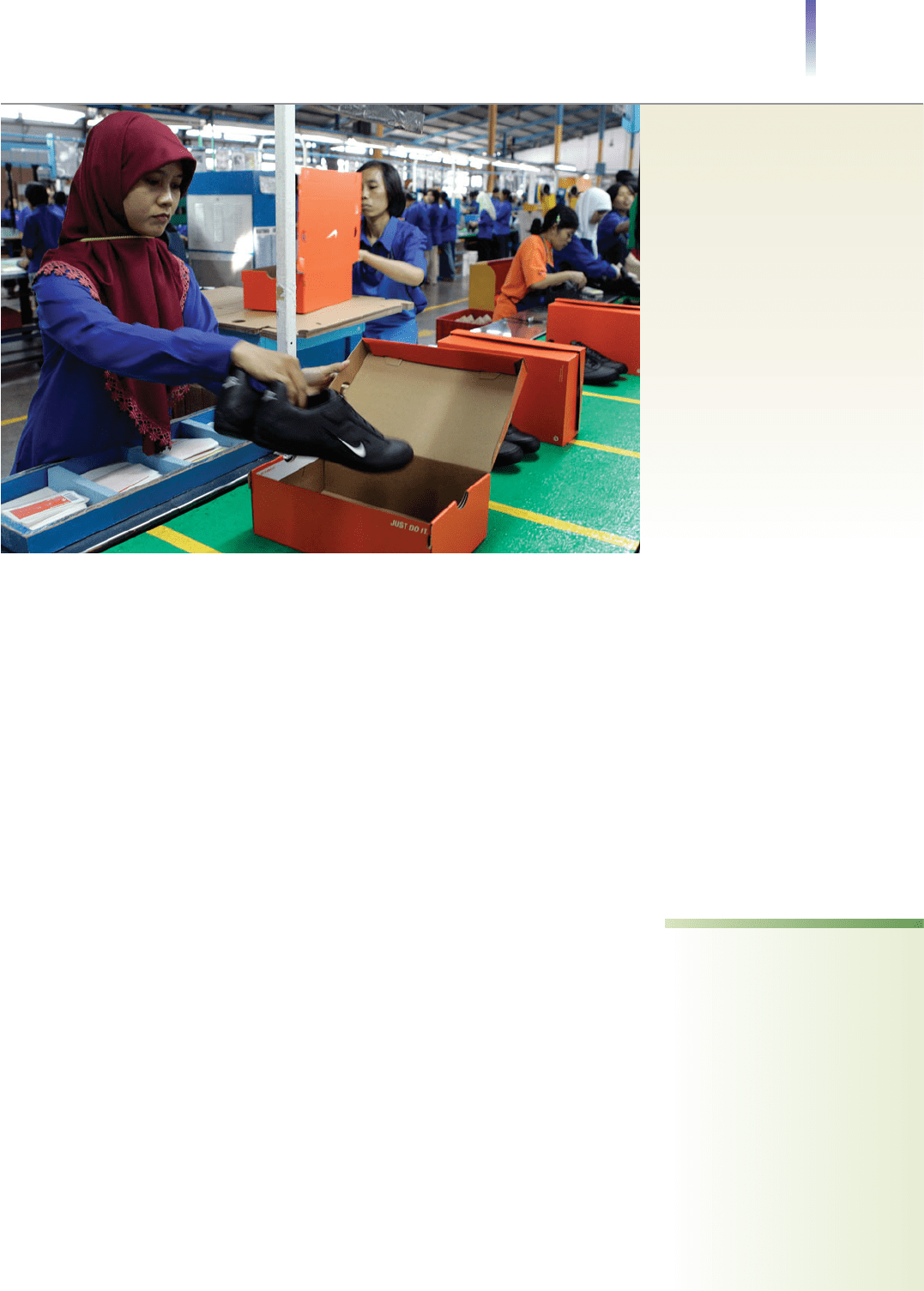
When an agricultural society industrializes, people work at many different types of
jobs. As the division of labor grows, people come to feel less solidarity with one an-
other. Grape pickers in California, for example, may feel that they have little in com-
mon with workers who make aircraft in Missouri. Yet, what each worker does
contributes to the economic system and, therefore, to the welfare of the others. Because
they are like the separate organs that make up the same body, Durkheim called this type
of unity organic solidarity.
Durkheim had observed the beginning of a global process. With our new global divi-
sion of labor, each of us now depends on workers around the globe. If we live in California
or New York—or even Michigan—we depend on workers in Tokyo to produce cars. Tokyo
workers, in turn, depend on Saudi Arabian workers to pump oil and South American work-
ers to operate ships that deliver that oil. We may not feel a sense of unity with one another,
but the same global economic web links all of us.
This process, now engulfing the world, is still in its early stage. As corporations
expand into new areas, they have hit some unexpected cultural hurdles, the topic of the
Cultural Diversity box on the next page.
Capitalism in a Global Economy
Corporate Capitalism. That capitalism could become the world’s dominant eco-
nomic force can be traced to a social invention called the corporation. A corporation
is a business that is treated legally as a person. A corporation can make contracts,
incur debts, sue and be sued. Its liabilities and obligations, however, are separate from
those of its owners. For example, each shareholder of Ford Motor Company—
whether he or she has 1 or 100,000 shares—owns a portion of the company. How-
ever, Ford, not its individual owners, is responsible for fulfilling its contracts and
paying its debts. The term corporate capitalism is used to indicate that corporations
dominate the economy.
Separation of Ownership and Management. One of the most surprising aspects of
corporations is their separation of ownership and management. Unlike most businesses,
it is not the owners—those who own the company’s stock—who run the day-to-day af-
fairs of the company (Sklair 2001). Instead, managers run the corporation, and they are
able to treat it as though it were their own. The result is the “ownership of wealth without
The Functionalist Perspective on the Globalization of Capitalism 409
In their march toward
globalization, multinational
companies locate their
corporate headquarters in one
country, manufacture their
components in another country,
assemble them in still another,
and sell the finished product
throughout the world. These are
some of the 14,000 workers in
Nike shoe factories in Indonesia.
organic solidarity
Durkheim’s term for the inter-
dependence that results from
the division of labor; people
depending on others to fulfill
their jobs
corporation a business en-
terprise, often jointly owned,
whose assets, liabilities, and ob-
ligations are separate from
those of its owners; as a legal
entity, it can enter into con-
tracts, assume debt, and sue
and be sued
corporate capitalism the
domination of an economic
system by giant corporations

410 Chapter 14 THE ECONOMY
Cultural Diversity around the World
Doing Business
in the Global Village
T
he globalization of capitalism means that busi-
nesspeople face cultural hurdles as they market
products in other countries. Some of the cultural
mistakes they make as they try to clear these hurdles
are downright humorous.
In trying to reach Spanish-speaking
Americans and Mexico’s growing mid-
dle class, some companies have stum-
bled over their Spanish. Parker Pen was
using a slogan “It won’t leak in your
pocket and embarrass you.” The trans-
lation, however, came out as “It won’t
leak in your pocket and make you
pregnant.” Frank Perdue’s cute chicken
slogan “It takes a strong man to make a
tender chicken” didn’t fare any better
in Spanish. It came out as “It takes an
aroused man to make a chicken affec-
tionate.” And when American Airlines
launched a “Fly in Leather” campaign
to promote its leather seats in first
class, the Mexican campaign stumbled
just a bit.“Fly in Leather” (vuela en
cuero), while literally correct, came out
as “Fly Naked.” I suppose that slogan
did appeal to some (Archbold and
Harmon 2001).
The Spanish market is so huge that it keeps enticing
companies to run marketing campaigns. The American
Dairy Association made a hit in the United States with
its humorous campaign,“Got Milk?” In Mexico, though,
the Spanish translation read “Are you lactating?” All
those mouths with white milk on them suddenly took
on new meaning. Coors didn’t fare any better. Their slo-
gan,“Turn It Loose,” was a hit in the United States, but
in Spanish it came out as “Get Diarrhea.”
Then there is Hershey’s new candy bar, Cajeta Ele-
gancita, marketed to Spanish-speaking customers. While
cajeta can mean nougat, its most common meaning is
“little box.” The literal translation of cajeta elegancita is
elegant or fancy little box. Some customers are snicker-
ing about this one, too, for cajeta is also slang for an inti-
mate part of the female anatomy (“Winner . . .” 2006).
It isn’t only Spanish that has given U.S. companies
problems. Vicks decided to sell its cough drops in
Germany. In German, the “v” is pronounced “f.” Unfor-
tunately, this made Vicks sound like the “f” word in Eng-
lish, which is just what ficks means in German.
Cultural mistakes are a two-way street, of course.
A Swedish company makes Electrolux, a vacuum cleaner.
Their cute slogan reads just fine in Swedish, but the
translation for their U.S. ads came out as “Nothing
sucks like an Electrolux.”
Some businesspeople have managed
to avoid such problems. They have
seized profit opportunities in cultural
differences. For example, Japanese
women are embarrassed by the sounds
they make in public toilets. To drown
out the offensive sounds, they flush the
toilet an average of 2.7 times a visit (Iori
1988). This wastes a lot of water, of
course. Seeing this cultural trait as an
opportunity, a U.S. entrepreneur devel-
oped a battery-powered device that is
mounted in the toilet stall.When a
woman activates the device, it emits a
25-second flushing sound. A toilet-
sound duplicator may be useless in our
culture, but the Japanese have bought
thousands of them.
To be accepted in another culture,
sometimes even the product has to be
changed. In a process called transcreation,
cartoons designed originally for one au-
dience are modified to match the tastes
of an audience in another culture. The illustration in
this box shows this process. At the top is the U.S.
version of the Powerpuff Girls; at the bottom is how
the Powerpuff Girls appear on Japanese television.
Portraying Blossom, Buttercup, and Bubbles as leggy and
dressed in skimpy outfits has broadened their appeal
considerably: Not only do little girls look forward to
this cartoon on Saturday mornings, but so do many
adult Japanese men (Fowler and Chozick 2007).
For Your Consideration
1. Why is it often difficult to do business across
cultures?
2. How can businesspeople avoid cross-cultural
mistakes?
3. If a company makes a cultural blunder, what should
it do?
Japan
United States
